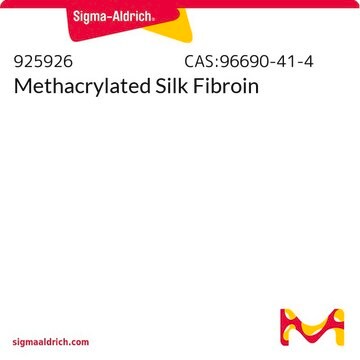935433
Heparin methacrylate (HepMA)
Synonym(s):
3D bioprinting, Bioprinting, HepMA, Heparin, Heparin methacrylate, Hydrogel
Sign Into View Organizational & Contract Pricing
All Photos(1)
About This Item
UNSPSC Code:
12162002
NACRES:
NA.21
Recommended Products
description
Degree of functionalization: 10-30% methacrylation
Quality Level
form
powder or chunks (or fibers)
color
white to off-white
Storage temp.
2-8°C
Related Categories
General description
Heparin methacrylate (HepMa) is a functionalized natural polymer that can be used in 3D bioprinting and tissue engineering applications.
Heparin is a naturally occurring linear biopolymer and highly sulfated glycosaminoglycan (GAG). Research has demonstrated that heparin can modulate binding extracellular matrix proteins and sequester growth factors and cytokines, making them useful in 3D applications. The methacrylate-functionalization of heparin allows thermal or photochemical crosslinking via covalent conjugation. Heparins exhibit high anionic charge densities to promote large swelling ratios in water.
Heparin is a naturally occurring linear biopolymer and highly sulfated glycosaminoglycan (GAG). Research has demonstrated that heparin can modulate binding extracellular matrix proteins and sequester growth factors and cytokines, making them useful in 3D applications. The methacrylate-functionalization of heparin allows thermal or photochemical crosslinking via covalent conjugation. Heparins exhibit high anionic charge densities to promote large swelling ratios in water.
Application
Heparin based hydrogels are widely used in tissue engineering, 3D bioprinting, and drug delivery applications.
Features and Benefits
- Batch control offers reproducible models for preclinical toxicology testing and drug screening
- Extended shelf-life & stability
signalword
Warning
hcodes
Hazard Classifications
Acute Tox. 4 Oral
Storage Class
11 - Combustible Solids
wgk_germany
WGK 3
flash_point_f
Not applicable
flash_point_c
Not applicable
Choose from one of the most recent versions:
Certificates of Analysis (COA)
Lot/Batch Number
Don't see the Right Version?
If you require a particular version, you can look up a specific certificate by the Lot or Batch number.
Already Own This Product?
Find documentation for the products that you have recently purchased in the Document Library.
Anastasia Nilasaroya et al.
Biomaterials, 29(35), 4658-4664 (2008-09-19)
Synthetic scaffolds show great promise for use in tissue engineering due to their ability to mimic some aspects of the extracellular matrix, however, their use has been hindered by the lack of inherent recognition sites that are required for protein
Hangjun Ding et al.
ACS nano, 8(5), 4348-4357 (2014-04-18)
The emergence of flexible and stretchable electronic components expands the range of applications of electronic devices. Flexible devices are ideally suited for electronic biointerfaces because of mechanically permissive structures that conform to curvilinear structures found in native tissue. Most electronic
Danielle S W Benoit et al.
Biomaterials, 28(1), 66-77 (2006-09-12)
Poly(ethylene glycol) (PEG) hydrogels functionalized with heparin were utilized as a three-dimensional culture system for human mesenchymal stem cells (hMSCs). Heparin-functionalized hydrogels supported hMSC viability, as quantified through live/dead imaging, and induced osteogenic differentiation, as measured by increased alkaline phosphatase
Our team of scientists has experience in all areas of research including Life Science, Material Science, Chemical Synthesis, Chromatography, Analytical and many others.
Contact Technical Service









